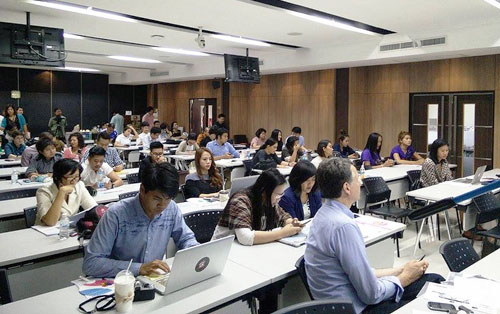Posted by Kent Klindera, August 3, 2015

amfAR’s Kent Klindera (front right) attends the Thai Transgender Alliance’s consultation meeting.
While Thailand is known for its relative tolerance of transgender individuals and as a major destination for people from across the globe seeking quality, low-cost gender reassignment surgery, Thai transgender individuals currently have no means to legally change their gender. This lack of legal recognition decreases their access to health services and stable employment and has a major impact on their ability to lead healthy, happy lives.
Last week, I attended a half-day consultation meeting sponsored by the Thai Transgender Alliance (TGA) as part of a project funded by amfAR, with support from the Arcus Foundation, to increase positive health outcomes among transgender people by securing legal gender recognition. TGA organized the consultation to raise national awareness about trans issues, share data collected through their project, and work with experts to formulate a strategy to move forward with their advocacy campaign.
As part of their amfAR-funded project, TGA members surveyed more than 275 transgender individuals throughout Thailand about their experiences with health services and human rights. During the meeting, they shared data from this year-long study that showed that more than 80% of the participants identified the lack of legal recognition as their greatest concern. Securing this right would also provide transgender individuals with legal recourse to combat the other challenges most cited in the survey—stigma and discrimination in healthcare settings, denial of educational opportunities, and workplace discrimination.
The consultation meeting, held at Bangkok’s Thammasat University, attracted over 120 participants, including academics, representatives from various government agencies—such as the Ministry of Health, Ministry of Justice, and Ministry of Defense, religious leaders, regional and national NGO representatives, and many transgender activists and individuals. Four media outlets were also represented, which created a buzz in the Thai media, and Ms. Jetsada "Note" Taesombat, the Thai TGA director, and Dr. Ronnapoom Samakkeekarom, the lead researcher, have since participated in numerous interviews and talk shows. Most of the media coverage was positive, but reflected a general lack of awareness about trans issues in Thailand—a situation the attention garnered by the TGA campaign is already starting to improve.
During the consultation, participants offered recommendations about what a gender recognition law should look like in Thailand, and all agreed that a law similar to one adopted in Argentina in 2012 would be most appropriate. The Argentine law gave people the right to specify how their gender is legally listed at the civil registry when their physical characteristics don't match how they see themselves. Importantly, it also reduced a legal provision found in many areas of the world requiring that people undergo extreme mental health diagnostic processes before they are allowed to legally change their gender. In addition, unlike in some countries, the law does not require gender reassignment surgery before a legal change can be secured. This provision is vital to ensure that transgender individuals with little means to pay for the expensive surgery have the legal right to change their gender.
Following the meeting, a few prominent legal scholars offered recommendations to help TGA improve their advocacy during a special working session. Despite the fact that the current political climate in Thailand makes advocacy work a bit challenging, as there is a military installed government, Thai TGA has made the historic decision to move forward in their pursuit of the law. And using the advice and feedback they received during the consultation, they have mapped out a yearlong strategy for achieving their goal.
Twenty-five years ago, I lived in Thailand for four years. Back then, transgender individuals, while tolerated, were seen as a joke and often treated like children. It was therefore amazing for me to see transgender activists truly championing their own rights and standing proud of who they are and who they will become. amfAR’s investment has been well spent, and I have no doubt that the Thai government will overturn this denial of a basic human right in the next few years.